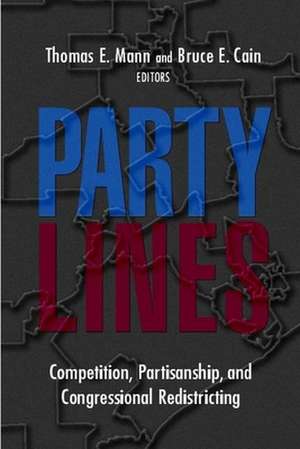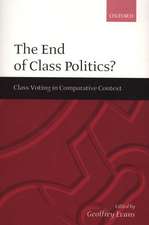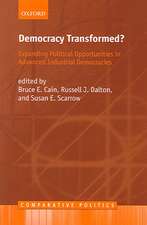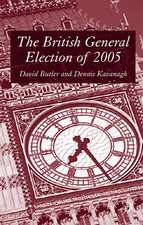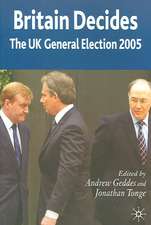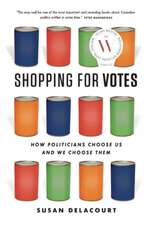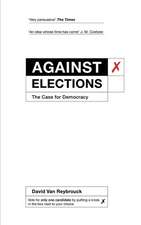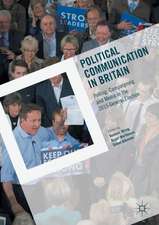Party Lines: Competition, Partisanship, and Congressional Redistricting
Editat de Thomas E. Mann, Bruce E. Cainen Limba Engleză Paperback – 14 noi 2005
The legitimacy of the American electoral system depends on sustaining reasonable levels of fairness, accountability, responsiveness, and common sense. Recent Congressional elections fly in the face of those requirements, however, with a startling lack of competition, growing ideological polarization, and a fierce struggle between the parties to manipulate the electoral rules of the game. Party Lines addresses these problems head on in an authoritative and timely analysis of redistricting in the United States. The practice of state legislatures redrawing district lines after the decennial census has long been a controversial aspect of our governing system. Recent developments have added new urgency to earlier debates. The sorry spectacle of mid-decade partisan gerrymandering in Texas renewed public attention to the potential problems of redistricting, reinforcing the view that it is unfairly dominated by self-serving elected officials and parties. The perfunctory character of Congressional elections is another growing problem—in 2002, only four House incumbents were defeated in the general election, the lowest in American history. Despite a hotly contested presidential contest in 2004, that number increased by only three. In Pa rty Lines, eminent political analysts explain the legal and political history of redistricting since the one person–one vote revolution in the 1960s and place it in the larger context of American politics. The authors document the impact of redistricting on competition, polarization, and partisan fairness, and they assess the role technology played in the redistricting process. The final chapter analyzes options for reform, including most importantly the use of independent redistricting commissions as an alternative to the normal state legislative process. Redistricting reform is no panacea but it is a start toward ensuring that American voters still have the largest say in who will represent them. Contributors include Micah Altman (Harvard Universtity), Bruce Cain and Karin MacDonald (University of California, Berkeley),Cherie Maestas (Texas Tech), Sandy Maisel (Colby College), Thomas Mann (Brookings), Michael McDonald (George Mason University), Nathaniel Persily (University of Pennsylvania ), and Walter Stone (University of California, Davis).
Preț: 207.89 lei
Nou
Puncte Express: 312
Preț estimativ în valută:
39.78€ • 41.45$ • 32.94£
39.78€ • 41.45$ • 32.94£
Carte tipărită la comandă
Livrare economică 03-17 aprilie
Preluare comenzi: 021 569.72.76
Specificații
ISBN-13: 9780815754671
ISBN-10: 0815754671
Pagini: 125
Dimensiuni: 152 x 229 x 10 mm
Greutate: 0.2 kg
Editura: Brookings Institution Press
Colecția Brookings Institution Press
ISBN-10: 0815754671
Pagini: 125
Dimensiuni: 152 x 229 x 10 mm
Greutate: 0.2 kg
Editura: Brookings Institution Press
Colecția Brookings Institution Press
Notă biografică
Thomas E.Mann is a senior fellow in Governance Studies at the Brookings Institution, where he holds the W. Averell Harriman Chair. He is a frequent media commentator on American politics. Bruce E. Cain is Heller Professor of Political Science at the University of California–Berkeley and director of the UC Washington Center. He is the author or editor of more than a dozen books.
Descriere
The legitimacy of the American electoral system depends on sustaining reasonable levels of fairness, accountability, responsiveness, and common sense. Recent Congressional elections fly in the face of those requirements, however, with a startling lack of competition, growing ideological polarization, and a fierce struggle between the parties to manipulate the electoral rules of the game. Party Lines addresses these problems head on in an authoritative and timely analysis of redistricting in the United States. The practice of state legislatures redrawing district lines after the decennial census has long been a controversial aspect of our governing system. Recent developments have added new urgency to earlier debates. The sorry spectacle of mid-decade partisan gerrymandering in Texas renewed public attention to the potential problems of redistricting, reinforcing the view that it is unfairly dominated by self-serving elected officials and parties. The perfunctory character of Congressional elections is another growing problem—in 2002, only four House incumbents were defeated in the general election, the lowest in American history. Despite a hotly contested presidential contest in 2004, that number increased by only three. In Pa rty Lines, eminent political analysts explain the legal and political history of redistricting since the one person–one vote revolution in the 1960s and place it in the larger context of American politics. The authors document the impact of redistricting on competition, polarization, and partisan fairness, and they assess the role technology played in the redistricting process. The final chapter analyzes options for reform, including most importantly the use of independent redistricting commissions as an alternative to the normal state legislative process. Redistricting reform is no panacea but it is a start toward ensuring that American voters still have the largest say in who will represent them. Contributors include Micah
